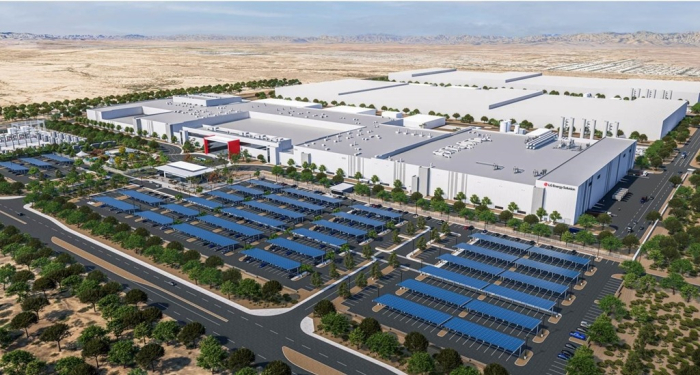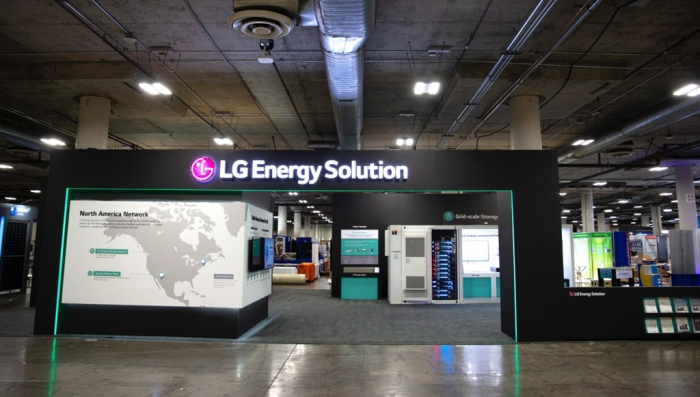LG Energy halts Arizona battery plant building on weak EV sector
The halt is expected to cut LG Energy’s investment in the Arizona complex by a third; share prices at record low
By Jun 28, 2024 (Gmt+09:00)
When in S. Korea, it’s a ritual: Foreigners make stops at CU, GS25, 7-Eleven


Maybe Happy Ending: A robot love story that rewrote Broadway playbook


NPS yet to schedule external manager selection; PE firms’ fundraising woes deepen


Seoul appeal: Korean art captivates Indonesia’s affluent connoisseurs


K-pop stocks surge as China set to loosen cultural ban after 9 years



LG Energy Solution Ltd., the world’s third-largest electric vehicle (EV) cell maker, has suspended construction of a plant in Arizona for batteries used in energy storage systems (ESS) to slow its investments amid global EV industry weakness stemming from sluggish demand.
The Tesla supplier recently halted construction of a factory for lithium iron phosphate (LFP) pouch-type batteries for ESS while continuing work on a facility for large cylindrical batteries with the 4680 form factor at the complex under construction in Queen Creek, Arizona, according to company sources in Seoul on Friday.
LG Energy aims to convert some under-utilized EV cell facilities in the US, the world’s third-largest clean-vehicle market, to produce ESS batteries, the sources said.
The South Korean company broke ground in April on the Arizona complex, with an annual capacity of 36 gigawatt hours (GWh) for cylindrical cells and 17 GWh for LFP ESS batteries, on which it had planned to spend 7.2 trillion won ($5.5 billion) for commercial operations from 2026.
With the halt in the LFP battery plant construction, the investment was estimated to shrink to 4.8 trillion won, industry sources said.
“We decided to adjust the pace of scheduled investments and optimize the operation of existing production facilities,” said an LG Energy official. “We have yet to decide when to resume construction.”
The news pushed down LG Energy’s share prices to a record low of 322,500 won on the Korean bourse. On Friday, shares ended down 0.5% at 326,500 won, underperforming a 0.5% gain in the benchmark Kospi.
ESS BATTERY PRODUCTION AT EXISTING FACILITIES
LG Energy decided to ramp up mass production of batteries for ESS at its existing US cell facilities, including a Michigan plant with a 20 GWh annual capacity, to meet growing demand in the country.
More customers have reportedly asked LG Energy and its rivals to supply batteries for ESS given that the US government has banned Chinese products.
Battery makers do not need to spend much money and time to add production lines for ESS batteries, industry sources in Seoul said.

TO REUSE WASTE BATTERIES
LG Energy recently launched a business that reuses waste batteries for ESS, according to sources.
The company set up its first ESS system reusing waste batteries in Texas. That came after it developed an ESS container system based on waste batteries with a partner in North America last year.
“We will expand the waste battery ESS business in North America based on that,” said the LG Energy official.
EV batteries, which lose about 20% of their charging performance after 10 years of use, can be recycled for clean vehicle cells or reused for ESS.
Less complex technology is required to reuse EV batteries than to recycle them. The latter process needs to recombine raw materials after pulverizing waste batteries, industry sources said.
Write to Hyung-Kyu Kim at khk@hankyung.com
Jongwoo Cheon edited this article.
-
 BatteriesLG Energy wins estimated $1 bn ESS battery deal from Qcells
BatteriesLG Energy wins estimated $1 bn ESS battery deal from QcellsMay 17, 2024 (Gmt+09:00)
2 Min read -
 BatteriesLG’s $5.5 billion LFP, ESS battery plants in Arizona to kick off in 2026
BatteriesLG’s $5.5 billion LFP, ESS battery plants in Arizona to kick off in 2026Apr 04, 2024 (Gmt+09:00)
3 Min read -
 BatteriesLG Energy to produce 4680 batteries in August for Tesla, others: CEO
BatteriesLG Energy to produce 4680 batteries in August for Tesla, others: CEOFeb 15, 2024 (Gmt+09:00)
4 Min read -
 BatteriesLG Energy Solution's ESS division posts first-ever profit
BatteriesLG Energy Solution's ESS division posts first-ever profitJan 30, 2024 (Gmt+09:00)
2 Min read


